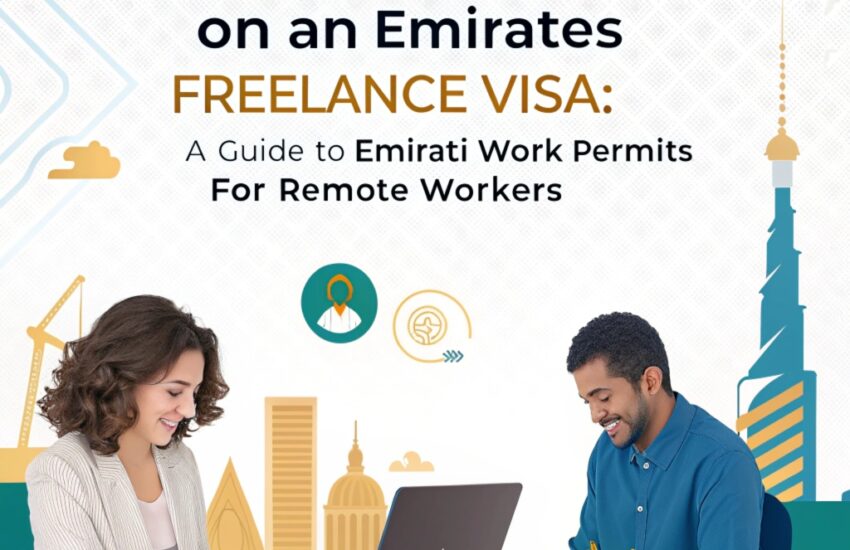Are you a digital nomad tired of navigating complex work visa processes, or a remote worker looking to relocate your business or career to the UAE?
Tucked away in Dubai and Abu Dhabi lies an untapped opportunity – for international freelancers and entrepreneurs alike.
The Emirates government has quietly introduced new regulations that make it easier than ever before.
With this guide you can now secure Emirati work permits for remote workers like never before, so the UAE’s business-friendly policies will be revealed in detail.
Follow along as we delve into the specifics of obtaining an Emirates Freelance Visa and explore what it takes to be eligible.
Getting Ready for an Emirates Freelance Visa Adventure
Getting your hands on an Emirates freelance visa can feel overwhelming, especially when it comes to preparing for this adventure. You’ve got to wonder how a country like Dubai became such a hotbed for remote work. It’s no secret that the UAE has been actively courting freelancers and digital nomads with open arms.
The key is understanding what makes an Emirates freelance visa tick. First, you need to have a decent reputation in your field. This might mean showcasing impressive projects or testimonials from previous clients or employers. Having a professional website will also help demonstrate your credibility as a freelancer.
Next up, the UAE has been cracking down on remote work since 2019 with new laws and regulations aimed at regulating this industry. One of these was the introduction of “remote work” visa in Dubai, which made it easier for freelancers to get their foot in the door. However there are certain requirements that must be met before you can even think about applying.
For example a minimum income requirement is needed as well as health insurance and have some savings set aside. Additionally a business card from your local police or gendarmerie may also need to be provided for this visa application process.
It’s worth noting too, the UAE has been actively trying to improve it’s image by making remote work more accessible for freelancers and businesses alike. This can’t help but make an Emirates freelance visa adventure a lot easier.
Understanding Remote Work Permits
Dubai’s new Freelance Visa program offers remote workers an attractive option for living in this vibrant city and introducing Dubai’s Freelance Visa: A game-changing opportunity for freelancers and digital nomads.
Understanding Remote Work Permits
Understanding remote work permits lies in grasping how they differ from traditional employment-based visas. The Freelance Visa is specifically designed for independent workers, allowing you to work on your schedule while still enjoying the benefits of living in Dubai.
To qualify for this visa, you’ll typically need a job offer or an entrepreneurial venture that aligns with UAE’s goals and priorities. This might include having at least 500 AED ($136 USD) in liquid assets, proof of health insurance, and a minimum monthly salary of 25,000 AED ($6,800 USD).
A Freelance Visa application typically requires submitting specific documents such as your qualifications and business plan. For instance, you must demonstrate how your skills align with the UAE’s strategic priorities for remote workers. This might involve providing details about a successful business model or highlighting achievements in your industry.
These benefits may include access to premium healthcare services, paid annual leave, or opportunities for professional development through workshops and training programs. For example, some businesses have found that investing in employee well-being has improved productivity and job satisfaction among remote workers.
The UAE’s business-friendly policies are designed to support the growth of independent professionals like yourself. This includes initiatives such as flexible working hours, work-life balance requirements, or streamlined regulatory processes for setting up a business. By embracing these changes, Dubai aims to become an even more attractive destination for freelancers and entrepreneurs alike.
By understanding the Freelance Visa program and its associated benefits, you can unlock your potential in this vibrant city.
Choosing the Right Visa Category for You and Your Business
What’s holding back your Dubai dream? Are you searching for a visa category that strikes a balance between flexibility and work requirements? If so, understanding which UAE visa is best suited to your needs can make all the difference. As an expert in Dubai’s job market, I’ll break down the key differences between Emirates freelance visas to help remote workers like you navigate this complex process.
When it comes to freelancing or self-employment in Dubai, there are several visa options available that cater specifically to entrepreneurs and independent contractors. The Freelance Visa (also known as an E-Visa) is a popular choice for those who want to operate their businesses without requiring local sponsorship or residency. This visa allows you to run your business independently, which can be particularly beneficial if you’re self-employed.
For instance, let’s consider the case of Sarah, a freelance writer from Australia who has been working in Dubai for years but wants more autonomy. She discovered that by applying for a Freelance Visa, she could operate her business without needing local support or approval. This freedom allowed her to take on new projects and scale up her work.
On the other hand, some remote workers might find themselves eligible for a Remote Worker’s permit under their current Employment Contract with a UAE national employer. If you’re in this situation, it may be possible to obtain additional leave from your employer or have flexible working arrangements that allow you to work remotely without being considered self-employed.

The Freelance UAE Visa is ideal for individuals who are ready to take the leap and become fully independent entrepreneurs. With no local sponsor or residency requirements, freelancers can focus on growing their businesses without unnecessary bureaucratic hurdles. However, if you’re still employed with a UAE national employer but desire more flexibility in your work arrangement, explore options like a Remote Worker’s permit.
Key Takeaways:
* Freelance Visa: ideal for self-employed individuals who want independence and freedom
* Remote Worker’s permit: suitable for those already employed under an Employment Contract
Whether you’re just starting or looking to scale up your freelance career in Dubai, understanding the ins and outs of UAE visas is essential. So don’t hesitate – start exploring visa options that cater specifically to your business needs today!
Emirati Work Permit Application Process in Detail
Ready to secure your UAE work permit? Navigating the freelance visa application process can be daunting, but breaking it down into manageable steps makes all the difference.
The Emirati Work Permit Application Process Steps:
- Gather required documents: This is often where applicants get stuck, unsure of what specific documents are needed. Typically, you’ll need to provide:
* Passport photos
* Proof of identity (ID card or passport)
* Qualifications certificates (e.g., bachelor’s degree in English language arts from a recognized institution)
* Contracts with clients or employers (for remote workers)
These documents serve as the foundation for your application. Make sure you have all the necessary materials ready to avoid delays.
- Find an employer who is authorized to sponsor foreign workers: This can be a company-dedicated HR team, such as those at tech firm IBM, which has partnered with international recruitment agencies to aid ex-pats.
Some leading companies in Dubai offer online portals and specialized support for applicants, making the process more accessible.
- Be aware of specific requirements:
* Age restriction: 30 years old or younger
* Certain job types are off-limits to foreigners (e.g., healthcare professionals)
* Language proficiency in Arabic may be required
- Submit your application through approved channels: This typically involves submitting the necessary documents and information through designated online portals.
Processing times can vary, so patience is key. Some applicants may need to pay an administrative fee or face delays due to visa category changes (e.g., some categories take 15 days longer than others).
- The Importance of Having a Sponsor:
A sponsor is often required for remote workers; this may be:
* An employer willing to vouch for you
* A UAE national with whom you share business interests, signing an employment agreement
Having a sponsorship in place can also grant access to valuable networking opportunities and potentially increase your chances of securing the permit.
- Top Tips For Successful Application Process:
Don’t forget that language proficiency in Arabic may be required.
Some companies require additional documentation (e.g., police clearance certificates).
Here are some success stories from ex-pats who have secured UAE work permits through Emirates freelance visas:
* “I was able to secure a remote teaching job after just three attempts.” – Rachel, UK-based educator
* “My business partner and I successfully landed a contract with Dubai Tourism.” – Ali, US entrepreneur
These individuals offer valuable insights into what works best for securing your UAE work permit.
Managing Visas as a Solo Entrepreneur
For remote workers considering setting up shop in Dubai, understanding your options is crucial for a seamless transition. With various visa types to choose from, navigating the process can be overwhelming.
The Freelance Visa is specifically designed for remote workers like yourself. This visa allows you to live and work in the UAE without an employer’s sponsorship. To apply, visit the Ministry of Human Resources and Emiratization website or one of their centers.

To be eligible, your income must exceed AED 20,000 per month ($5,500 USD), equivalent to a good starting point for freelancers. Your degree or diploma should be from an accredited institution in your home country or obtained through relevant experience (e.g., programming certifications like AWS Certified Developer).
UAE authorities recognize diplomas from countries like the United States, Canada, and the UK. However, some institutions may have specific requirements; it’s best to check with them directly.
Before applying for your freelance visa, ensure you have health insurance coverage through a UAE-based insurer. This is crucial as it covers medical expenses in case of an accident or illness while living in Dubai.
The application process involves submitting online and paying the required fee (approximately $180 USD). You can renew your visa every six months with simple submission and payment requirements, largely the same as initial processing but with some documentation adjustments depending on whether you submit in person or through mail.
Registering a local business is also essential for remote workers. This process involves setting up a company registration that typically takes 15 days to complete and requires an additional $350 USD fee for non-UAE citizens.
To streamline the registration process, you’ll need to provide proof of identity, residence, and other documents accepted by UAE authorities (such as a passport photo). You may also require notary services or document authentication if needed. The official government website will guide you through this step-by-step:
- Create an account on MBRShores.
- Fill in the required information for your company registration.
- Pay the applicable fees and provide supporting documents.
Registration of a local business affects tax obligations and employment regulations, so be sure to familiarize yourself with UAE’s labor laws and taxation requirements.
By following these steps, remote workers can establish themselves as independent entrepreneurs in Dubai without an employer’s sponsorship, allowing for greater freedom and flexibility in their careers.
Tips For Obtaining A UAE Freelance Visa on Time
To operate legally in Dubai, navigate through UAE’s complex process of securing a permit that allows remote workers like yourself to work smoothly.
Navigating the UAE freelance visa application process can be daunting, but with the right guidance, it can also be smooth and efficient. One challenge is understanding which types of work permits are available in Dubai and selecting the best option for your situation.
Gathering paperwork is crucial. You’ll need a range of documents that support your application. Here’s what you should include:
* Proof of income from tax returns or business licenses
* Up-to-date bank statements showing financial stability
* Health insurance documents to demonstrate financial responsibility
The UAE requires specific documentation depending on the type of visa you’re applying for, so research and review these requirements carefully. Choose a reputable service provider who specializes in freelance visas. They can help streamline your application process and save you time. Look for providers with expertise in handling similar cases successfully.
A UAE Freelance Visa typically involves fees and costs associated with processing the permit itself, as well as additional charges from consultants or lawyers who may be able to speed up the process. Clarify what payments are required before submitting your application.
Understand that this process takes time, effort, and dedication. Be prepared for a challenge, especially if it’s complex.
To increase your chances of success:
Don’t attempt to go alone! Working with an experienced immigration lawyer or consultant is crucial.
Research thoroughly the UAE employment rules to avoid costly mistakes.
Be patient and persistent throughout the application process.
By following these tips, you’ll be better equipped to navigate the complexities of securing a UAE Freelance Visa quickly and efficiently.
Making The Most Of Your Emirates Freelance Visa Experience
As a freelancer with an Emirates work permit, you’re not just setting up shop in Dubai – you’re opening doors to new opportunities, cultural immersion, and professional growth. Let’s dive into the top strategies for maximizing your freelance visa benefits.
** Take Advantage of Online Groups
- Join groups focused on freelance writing in Dubai or attend workshops organized by the UAE Freelancers Association to network with other professionals and stay updated on industry trends.
- Reach out to 5-10 people who could benefit from your skills, whether it’s through LinkedIn messages, social media comments, or follow-up emails.
**Prioritize Skills Development
* Allocate 3-5 hours a day for skill-building exercises tailored to your industry
* Utilize platforms like Coursera or LinkedIn Learning at an affordable cost
**Embracing Emirati Culture
* Learn Arabic phrases like “as-salamu alaykum” and use them in conversations with locals
* Attend local events, join cultural organizations, or participate in traditional tea ceremonies to gain a deeper understanding of UAE culture
* Use your newfound language skills to discuss project details with clients in their native tongue
**Personal Development
* Focus on developing skills that will make you more attractive to potential employers:
+ Arabic language and literature
+ Local business operations (e.g., Dubai’s market trends, regulations)
+ Cultural studies (e.g., Emirati customs, traditional practices)
Don’t underestimate the value of mastering local Arabic phrases like “as-salamu alaykum.” It’s a conversation starter that can help you connect with UAE-based clients, even if it means using your newfound language skills to discuss project details in their native tongue.

**Tax-Free Salary Payments
| Tax Year | Typical Deduction |
| 2023-2024 | AED 10,000 – AED 20,000 |
To track tax-free salary payments through online platforms:
- Use the website provided by UAE’s Expat bank account administrators
- Monitor your monthly deductions to stay on top of taxes
- Utilize tools like spreadsheets or budgeting apps to categorize and manage expenses
By prioritizing personal development, Tapping into virtual communities, embracing Emirati culture, and staying on top of tax-free salary payments – you’ll be well-equipped for long-term success as a freelancer in Dubai.
As an Emirates work permit holder, take control of your career by implementing these strategies. Don’t let this new opportunity pass you by!
UAE’s Remote Worker Community and Networking Opportunities
Dubai’s unique blend of innovative culture, stunning landscapes, and thriving startup scene make it an attractive destination for remote workers. Let’s dive into how you can take advantage of Dubai’s ideal location to start or expand your online venture.
As you explore Dubai’s vibrant startup ecosystem, networking opportunities begin to reveal themselves in many ways. From international conferences that bring together top experts in various fields like the Dubai Startup Festival, to coworking spaces like Media City and Innovation Hub, which provide a platform for entrepreneurship skills workshops and networking events. These hubs are designed specifically for digital professionals, making it easy to connect with fellow entrepreneurs.
You’ll have access to several notable networking platforms centered around entrepreneurship, including:
- The Entrepreneurs Organization (EO)
- Startup Grind
- Remote workers community
- Additionally, you can connect with other remote workers in Dubai through online communities like LinkedIn groups or Facebook. For example, the Dubai Remote Workers group on LinkedIn boasts over 10,000 members and offers valuable insights into remote work experiences. Similarly, Facebook’s “Dubai Remotely” group has over 15,000 followers and provides a platform for job seekers to find remote opportunities.
The city hosts numerous business incubators and accelerators that support early-stage companies. Some notable examples include the Dubai Future District’s innovation hub and the Smart Nation Lab’s accelerator program. These programs provide valuable resources and mentorship to help startups grow and succeed in the market.
Setting up your online venture in Dubai is relatively straightforward, with costs comparable to those in Europe and Asia. The UAE government offers various tax incentives, such as exemption from corporate income taxes on foreign-sourced profits. This makes it an attractive destination for entrepreneurs looking to establish a business presence without breaking the bank.
Don’t be surprised if Dubai’s startup scene has you feeling like a kid in a candy store – there are so many great resources available! From networking events to coworking spaces, it can be overwhelming at first, but with some research and planning, you’ll find your footing quickly.
Balancing Work and Personal Life While Holding an Emirati Freelancer Visa
Getting an Emirati Freelancer Visa can be both exciting and overwhelming for remote workers. To maintain a work-life balance in Abu Dhabi, consider these essential tips.
Creating boundaries between your workspace and downtime is crucial when working from a foreign land with different time zones and cultural norms. Consider allocating specific hours for focused work while setting aside evenings and weekends for personal activities that bring joy or relaxation.
Emirati Freelancer Visa holders often have access to excellent coworking spaces like WeWork, Coworker, or Hub24Seven with amenities such as meeting rooms, high-speed internet, and comfortable seating areas. Take advantage of these resources to create a productive environment during your working hours.
However, be mindful not to overwork yourself. Remote workers in Abu Dhabi need to prioritize self-care by doing activities like meditation classes at yoga studios or beachside yoga practices that cater to the UAE climate and culture. Regular exercise can help alleviate stress and improve overall well-being.
To strike a better balance between work and personal life, establish clear expectations with clients or colleagues about your availability and boundaries. This will prevent burnout, allow for adequate sleep, and social interaction, and ensure a more fulfilling experience in Abu Dhabi.
Consider these specific self-care activities suitable for Abu Dhabi’s climate:
* Joining local sports clubs like Dubai Fitness Academy or Marina Mall Sports Centre to stay active
* Taking Arabic language classes at the Emirates Aviation University or online platforms like Duolingo
* Exploring traditional Emirati customs and practices, such as attending a Qur’an recitation class in an Abu Dhabi mosque
As remote workers navigate these challenges with their Emirates Freelancer visa, they can learn from successful digital nomads who have adapted to life in the UAE. For example, Sarah from Australia found that setting aside time for outdoor activities like hiking and cycling helped her maintain a work-life balance while working remotely.
Remember that a successful work-life balance as an Emirati Freelancer Visa holder requires ongoing effort, flexibility, and adaptation to the UAE context. By establishing clear boundaries, prioritizing self-care, and embracing local culture, you can thrive in your new environment.
Preparing for the Future of Remote Employment in UAE
Great companies don’t wait around for talent!
The Emirates Freelance Visa offers a clear pathway for remote workers, allowing them to secure residency and work permits within weeks, not months. By taking advantage of this opportunity, businesses can tap into a global pool of skilled professionals, fueling innovation and growth.
A streamlined application process means less time spent on paperwork and more focus on what matters – hiring the right team members. Remote employees will also benefit from smoother transitions as they explore opportunities in UAE cities like Dubai.
Seize the chance to attract top talent today!
Take decisive action now by exploring Emirates Freelance Visa options, ensuring your organization stays ahead of the curve in a rapidly changing job market.
